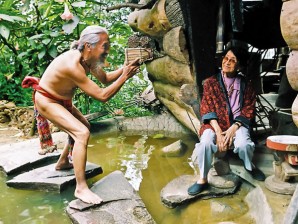Artist sees halt to ruinous growth in IPs

KIDLAT Tahimik with his camera in a playful pose with his mother, former Baguio Mayor Virginia de Guia. EV ESPIRITU/INQUIRER NORTHERN LUZON
BAGUIO CITY—For independent filmmaker Kidlat Tahimik, an Asian award has come at a critical time when indigenous wisdom is much-needed to help heal what he describes as an “out-of-balance planet.”
At a time when greed has been and continues to be regarded as a “driver” for economic progress, the world needs a brake system to regulate, if not moderate, an obsession for GNP (Gross National Product) or GDP (gross domestic product)-oriented growth that comes at a heavy cost.
The cost includes global warming as a result of fossil fuels and overextraction of minerals and forest products, among other things.
“This preno (brake) system is found in indigenous culture,” says Kidlat.
This year’s recipient of the Fukuoka Award for arts and culture says the prize “validates the value of indigenous culture in helping serve as a brake system to over development, which has brought us an out-of-balance planet.”
Article continues after this advertisementOrganized by the Yokatopia Foundation in Fukuoka City, Japan, the Fukuoka Award was established in 1990 to honor outstanding achievements by people or groups or organizations in preserving and creating the unique and diverse cultures of Asia.
Article continues after this advertisementThe aim is “to foster and increase awareness of the value of Asian cultures as well as to establish a framework within which Asians can learn from and share with each other,” says the foundation’s brochure.
Kidlat says his romance with indigenous culture and his efforts to help promote it as a brake system to “over development” and as a counter force to Hollywood culture and all what it represents may have caught the eye of judges for the award.
He remembers and honors his indigenous mentors, who, he says, are sharing the award with him. He cites elder Lopes Nauyac of the village of Patpat in Hungduan, Ifugao, who has planted one million native trees to help sustain the threatened “pinugo” or “muyong” practice in his community. Nauyac maintains a nursery of native trees and other plant species.
Pinugo or muyong refers to the clan or community-maintained woodlots strategically located above each cluster of the famed Ifugao rice terraces.
An age-old practice, which has sustained the 3,000-year-old rice terraces, the pinugo or muyong tradition, stresses biological diversity as opposed to monocropping tree planting programs.
Kidlat has immersed himself in Nauyac helping community folk document their culture.